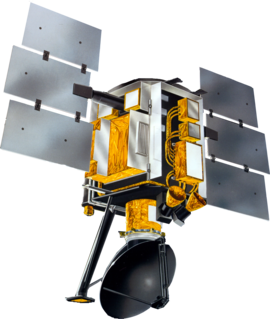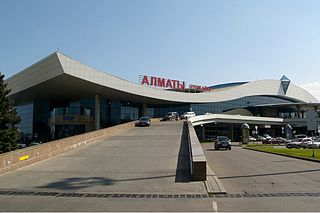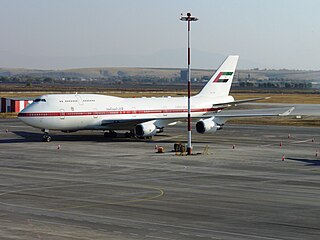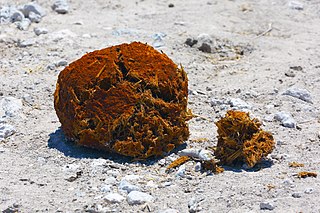See also
| This disambiguation page lists articles associated with the title SCATS. If an internal link led you here, you may wish to change the link to point directly to the intended article. |
SCATS as an acronym may refer to:
Scats may also refer to:
| This disambiguation page lists articles associated with the title SCATS. If an internal link led you here, you may wish to change the link to point directly to the intended article. |

Transport in Kyrgyzstan is severely constrained by the country's alpine topography. Roads have to snake up steep valleys, cross passes of 3,000 m (9,843 ft) altitude and more, and are subject to frequent mud slides and snow avalanches. Winter travel is close to impossible in many of the more remote and high-altitude regions. Additional problems are because many roads and railway lines built during the Soviet period are today intersected by international boundaries, requiring time-consuming border formalities to cross where they are not completely closed. The horse is still a much used transport option, especially in rural and inaccessible areas, as it does not depend on imported fuel. For transport in the Soviet Union, see Transport in the Soviet Union.

A society is a group of individuals involved in persistent social interaction, or a large social group sharing the same spatial or social territory, typically subject to the same political authority and dominant cultural expectations. Societies are characterized by patterns of relationships between individuals who share a distinctive culture and institutions; a given society may be described as the sum total of such relationships among its constituent of members. In the social sciences, a larger society often exhibits stratification or dominance patterns in subgroups.

Traffic on roads consists of road users including pedestrians, ridden or herded animals, vehicles, streetcars, buses and other conveyances, either singly or together, while using the public way for purposes of travel. Traffic laws are the laws which govern traffic and regulate vehicles, while rules of the road are both the laws and the informal rules that may have developed over time to facilitate the orderly and timely flow of traffic.

In vocal jazz, scat singing is vocal improvisation with wordless vocables, nonsense syllables or without words at all. In scat singing, the singer improvises melodies and rhythms using the voice as an instrument rather than a speaking medium.

An intelligent transportation system (ITS) is an advanced application which aims to provide innovative services relating to different modes of transport and traffic management and enable users to be better informed and make safer, more coordinated, and 'smarter' use of transport networks.

A ramp meter, ramp signal, or metering light is a device, usually a basic traffic light or a two-section signal light together with a signal controller, that regulates the flow of traffic entering freeways according to current traffic conditions. Ramp meters are used at freeway on-ramps to manage the rate of automobiles entering the freeway. Ramp metering systems have proved to be successful in decreasing traffic congestion and improving driver safety.
Scat or SCAT may refer to:

A detection dog or sniffer dog is a dog that is trained to use its senses to detect substances such as explosives, illegal drugs, wildlife scat, currency, blood, and contraband electronics such as illicit mobile phones. The sense most used by detection dogs is smell. Hunting dogs that search for game, and search dogs that work to find missing humans are generally not considered detection dogs. There is some overlap, as in the case of cadaver dogs, trained to search for human remains. A police dog is essentially a detection dog that is used as a resource for police in specific scenarios such as conducting drug raids, finding missing criminals, and locating stashed currency.

The NASA QuikSCAT was an Earth observation satellite carrying the SeaWinds scatterometer. Its primary mission was to measure the surface wind speed and direction over the ice-free global oceans. Observations from QuikSCAT had a wide array of applications, and contributed to climatological studies, weather forecasting, meteorology, oceanographic research, marine safety, commercial fishing, tracking large icebergs, and studies of land and sea ice, among others. This SeaWinds scatterometer is referred to as the QuikSCAT scatterometer to distinguish it from the nearly identical SeaWinds scatterometer flown on the ADEOS-2 satellite.

Nursultan Nazarbayev International Airport is an international airport in Akmola Region, Kazakhstan. It is the primary international airport serving Nur-Sultan. The airport is the second-busiest international air passenger gateway into Central Asia, the 13th-busiest airport in the Post-Soviet states, the second-busiest airport in Kazakhstan.

Almaty International Airport is the largest international airport in Kazakhstan. It is about 15 km (9.3 mi) northeast of Almaty, the country's largest city and commercial capital. Almaty airport accounts for half of passenger traffic and 68% of cargo traffic to Kazakhstan. In 2012, the airport handled 4,003,004 passengers, including 1,997,570 arriving passengers, and 2,005,434 departing passengers.
The Sydney Coordinated Adaptive Traffic System, abbreviated SCATS, is an intelligent transportation system that manages the dynamic timing of signal phases at traffic signals, meaning that it tries to find the best phasing for a traffic situation. SCATS is based on the automatic plan selection from a library in response to the data derived from loop detectors or other road traffic sensors.

Al Scates is a former American volleyball player and volleyball coach, who was head coach of the UCLA Bruins for 48 years. Scates is the winningest volleyball coach in the history of the NCAA, and the 19 NCAA titles the Bruins won during his tenure ties him for the most NCAA titles won by a coach in a single sport with Arkansas' John McDonnell. Scates' teams won collegiate volleyball championships in five different decades. In addition to coaching, Scates was a physical education instructor at Horace Mann, a school within the Beverly Hills Unified School District.

Shymkent International Airport ; is an airport serving Shymkent, Kazakhstan.
Traffic Optimization are the methods by which time stopped in road traffic is reduced.

The normal function of traffic lights requires more than slight control and coordination to ensure that traffic and pedestrians move as smoothly, and safely as possible. A variety of different control systems are used to accomplish this, ranging from simple clockwork mechanisms to sophisticated computerized control and coordination systems that self-adjust to minimize delay to people using the junction.

Feces are the solid or semisolid remains of food that could not be digested in an animal's small intestine. Bacteria in the animal's large intestine further break down the material. Feces contain a relatively small amount of metabolic waste products such as bacterially altered bilirubin, and the dead epithelial cells from the lining of the gut.
Adaptive traffic control system (ATCS) is a traffic management strategy in which traffic signal timing changes, or adapts, based on actual traffic demand. This is accomplished using an adaptive traffic control system consisting of both hardware and software.

MASSTR, the' Meadowlands Adaptive Signal System for Traffic Reduction, is an adaptive traffic control system commissioned by the New Jersey Meadowlands Commission (NJMC) for a forty square mile region in the New Jersey Meadowlands. Adaptive Signal Control Technology (ASCT) adjusts the signal timings based upon the flow of traffic instead of utilizing fixed or actuated timings. This regional intelligent transportation system (ITS) incorporates more than 128 traffic signals and serves more than 400,000 vehicles daily. MASSTR is one of a number of ITS projects deployed throughout New Jersey. MASSTR is the fourth-largest deployment of SCATS in the United States.

Scatophagus is a fish genus in the family Scatophagidae. Species in this genus are referred as spotted scats.